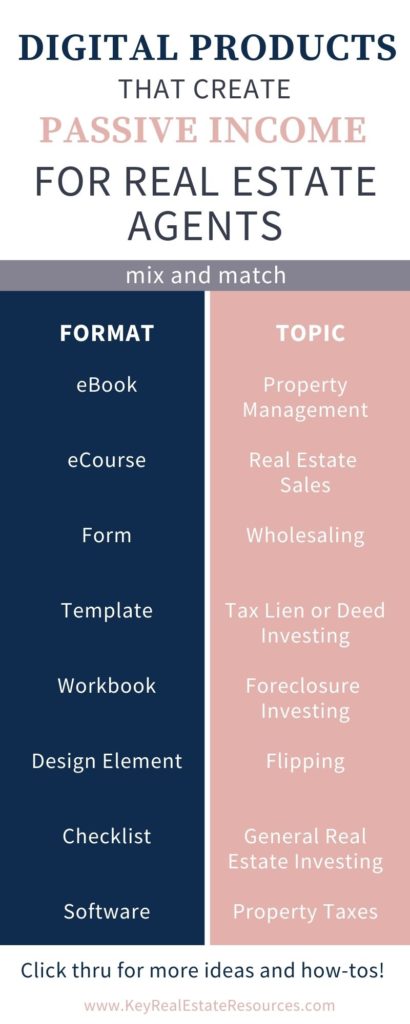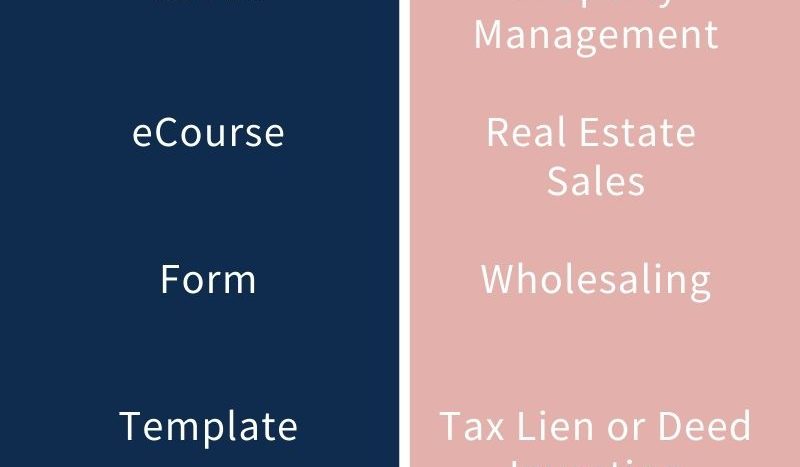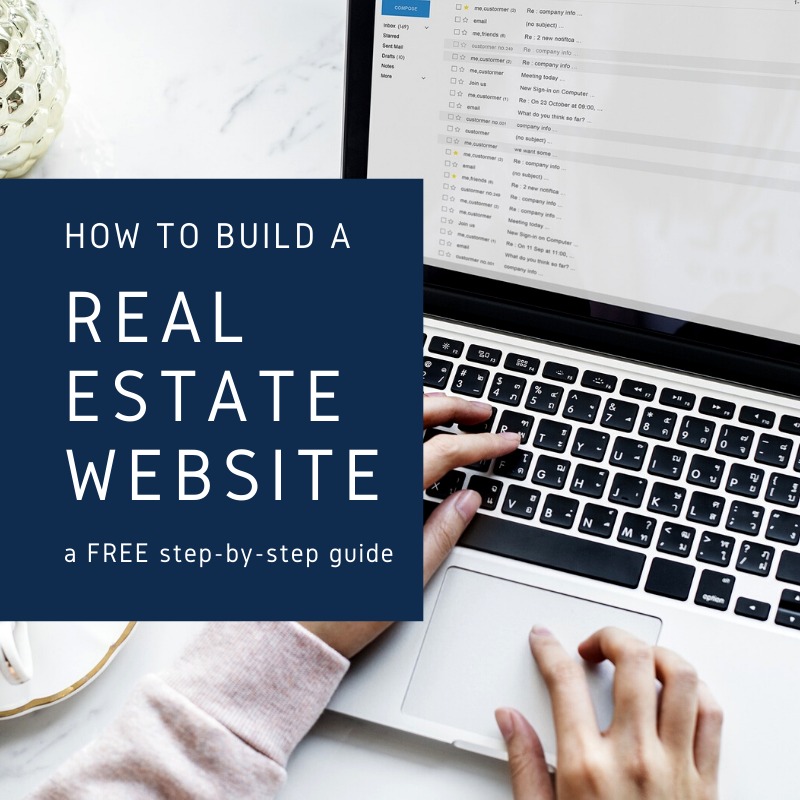Digital product creation is a genius way for real estate agents to create a largely passive income stream to supplement their real estate commissions. And you can tie your digital products into your existing real estate business so it feels more like a natural extension of your business and less like a side hustle.
If you’re not familiar with the term, digital products are simply goods that you can sell via digital download (as opposed to a physical product). eBooks and eCourses are popular options, but you could also sell templates, workbooks, forms, or design elements. More options coming up in a bit!
Let me tell you why I love digital product creation:
- You can create a product once, then sell it hundreds or even thousands of times.
- There’s very little (if any!) monetary investment required. Your big upfront investment is the cost of your time in creating your product(s)
- The delivery process can easily be automated through online sales platforms, so you never even have to email the download to your new customer. Your customer will automatically receive the download upon payment, meaning you can be making passive sales 24/7.
- With a little strategy, you can use your digital products to boost your credibility as a real estate expert, and perhaps even gain a new buyer or seller!
In this post, we’ll talk about digital products you can offer, how to make them, how to sell them, and how much money you can make from this unique income stream.

What Kind of Digital Products are a Good Fit for Real Estate Professionals?
Here’s a list of popular digital products:
- eBooks
- eCourses
- Templates
- Forms
- Design elements
- Custom written content
- Checklists
- Workbooks
- Photos
- Videos
- Software
But your real question might be how do these fit in with my real estate career?
As a real estate expert, you have specialized knowledge the general public doesn’t have. Any of this knowledge can be packaged as a digital product. But of course you don’t want to charge for the information you give your clients as part of your standard services. So what do you do?
Let’s consider some examples of ideal real estate topics you can package as digital products.
Real Estate Investing
Real estate investing is specific enough knowledge to productize. You can create eBooks and eCourses on real estate investing in general, or you can get specific, focusing on tax lien/deed investing, foreclosure investing, wholesaling, etc.
You could create spreadsheet templates to help investors analyze deals, checklists for initial property research, and workbooks for building a real estate investment business.
Property Management
How about creating form letters for private property managers, blog content for large property management firms, or affordable software for managing a small portfolio of rentals?
Real Estate Sales
If you’ve been in real estate for a while, there’s a good chance you’ve had to create a resource or two for yourself. A client database, an open house flier, mailers, door hangers…
Why not sell your designs to other agents? And don’t worry about the competition; if you’re selling digital products online, the vast majority of your customers will be from outside your local market.
How Do You Make Digital Products?
Creating digital products can be as simple or as sophisticated as you want.
In many cases, you can just open a word processing program and start typing. Then save your work as a pdf to give your original work a little protection.
If you’re creating designs, you may be using a more complex program like PhotoShop.
The important thing is to start where you are. Focus on products that can be created in programs you’re familiar with. As your digital product sales take off, you can always invest in learning new software or hiring a freelance designer, but there’s little point in doing this upfront before you learn your way around digital product sales.
How Do You Sell Digital Products?
You have lots of options for selling your digital products, and some platforms lend themselves to specific product types. Amazon.com, for example, is a solid option for selling your eBooks (learn more about this in How to Make Money Selling eBooks). Udemy is a platform designed specifically for creating and selling eCourses (learn more in How to Create Online Real Estate Courses). The best part: it’s typically free to create and publish your digital product(s) on these platforms. You only pay a commission to the platform each time you sell a product. So you’re able to get started immediately, risking no money at all!
Another great platform option for selling digital products is Etsy. This is where I currently sell digital templates, workbooks, content, and planners for real estate professionals. Unlike the other platforms mentioned, there is a listing fee for each item: a measly 29 cents. That 29 cents covers your listing for up to 4 months. Each time you sell a product (or your listing expires), you have the option to pay another 29 cents to renew your listing. On top of this fee, Etsy also charges a small processing fee and a small payment fee. The total of these fees varies slightly but typically comes to around 10% of the sales price. Perfectly reasonable!
You can also choose from the many platforms designed to help you sell products directly on your own platform. The benefit of this is that you maintain control. You’re able to complete the entire transaction on your site, without having users transferred to another site. You may also be able to set up more advanced features like subscription models and affiliate programs. The biggest downside is that you have to drive 100% of your own traffic (there’s no audience already searching a platform for your products. The other downside is that there is typically a monthly fee for service, regardless of whether or not any of your products sell. For this reason, I recommend you start with an established platform like Etsy, Amazon, or Udemy first. And once you have proof that your products will sell, you can reevaluate your selling platform.
How Much Money Can You Make With Digital Products?
As with real estate, your income is limited only by how hard and smart you work. And like real estate, it takes a little time to see some real cash flow.
But I’ll give you some real-world numbers using my own Etsy shop as an example.
I launched my shop in mid-February of 2019. As a full-time real estate content writer, this is definitely a side hustle for me. On average, I invest around 2 hours per week working on new products and listing them for sale. As of today, my shop has made a total profit of $6,432. So I’m averaging around $68 per work hour. And this number will continue to increase since my completed products are available in perpetuity. I’ll invest a little time updating them once a year or so, and enjoy the growing hourly rate for as long as I continue with this income stream.
There are several $100,000/year shops on Etsy. It just takes time to build up enough products to generate that kind of cash flow. Especially when you have a demanding day job and only a few hours per week to invest in this lucrative business.
Now, I can’t say I’m an Etsy expert, but I have learned a few things along the way to help increase Etsy income:
- Keywords are everything. Without targeted keywords, your customers won’t find your products.
- Etsy wants you to list new products regularly. I once went a couple months without listing a new product, and my sales suffered because Etsy figured I wasn’t as relevant as sellers who were listing regularly.
- The ads program(s) may or may not work for you. I personally haven’t had much luck with them.
- Promote your products on social media and your own website. Etsy rewards sellers who drive traffic to the platform by giving them higher priority in the search results.
Are You Going to Try Digital Product Creation?
I’d love to hear your thoughts on whether digital product creation is a good fit for your real estate business model. Is this something you’re willing to try? Why or why not? Let me know in the comments.









